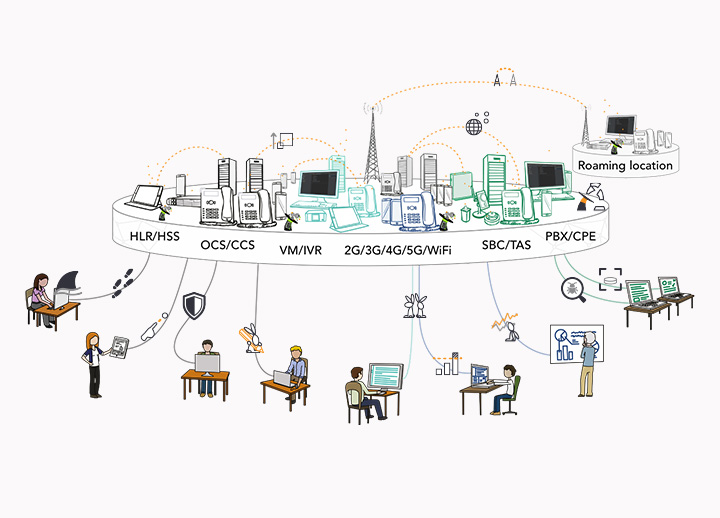The revolution in international roaming & interconnect testing
We implement roaming tests globally. Intended for global network operators, our international roaming testing service is uniquely designed to set a new industry standard with real-device testing across multiple countries.

The offer
A centralized setup with remote control
QiTASC offers an innovative, lean test automation solution for global roaming tests. It provides unparalleled accuracy and reliability from the get-go. Our pioneering solution outshines all other solutions on the market and propels your business to the forefront.

Testing mobile to backend:
Comprehensive coverage of test automation from mobile devices through to backend systems, ensuring end-to-end validation of telecom services.

Easy-to-use software:
Our user-friendly testing framework uses simple, conversational English for script writing, making it easy for your team to set up and execute tests without deep programming knowledge.

Global operation:
Configurable to operate in over 100 countries, providing a versatile tool for global telecom operators.

Diverse technologies:
Supports testing across 2G, 3G, 4G, 5G NSA, WiFi and 5G SA networks, covering a broad spectrum of telecom technologies.

Remote interaction:
Being able to control devices remotely is invaluable for test development. Testers can manually interact with a device to explore or replicate specific scenarios, then automate those interactions in test scripts. This feature is especially useful for detailed interactive sessions and troubleshooting.

Flexible usage:
QiTASC offers both an IntelliJ-based IDE and a secure web interface for developing and managing test cases and projects. This integration provides a robust environment for script creation and project management, enhancing productivity and user experience.

Scalability:
Our modular architecture easily adapts to new technologies, ensuring your testing capabilities remain cutting-edge without extensive overhauls. Designed to scale horizontally, it meets growing network demands without performance compromises.

Secure testing:
Enhanced security protocols such as mTLS and certificate management secure testing operations.

Audio testing:
Incorporating tools like OOKLA, POLQA and VisQol enables precise audio quality testing and data service testing within test cases. This is essential for validating voice & data services and other audio- dependent features, e.g. network announcement verification in telecom services.

Intuitive reporting:
Robust reporting tools that offer customizable logs and result visualization aid quick decision-making.

Accuracy:
Achieve unmatched testing accuracy with our support for both simulated and real mobile devices, ensuring your network performs optimally under all conditions.

Automated verification:
QiTASC enhances test case development with automated verification capabilities, such as automated CDR verification, which automatically compares charge data records against expected results. This reduces manual verification tasks and increases the accuracy and reliability of test outcomes.

Easy scripting:
QiTASC uses a layered architectural approach that facilitates the development of test cases across different technologies and platforms. This structure supports the separation of test logic from implementation details, which helps to maintain clean and efficient test scripts.

Easy integration:
Easily integrates with open-source tools, enhancing utility and reducing operational friction.

Secure environment:
Secure and isolated environments for multiple clients in a single instance, ensuring data integrity and operational security.

No interruptions:
The framework runs independently of GUI changes, which allows tests to run uninterrupted even with updates to the user interface of the tested software.

Handling of multiple SIMs:
Efficient handling of thousands of SIMs through advanced SIM management features and seamless integration with SIM multiplexers and eSIM platforms.

Regular releases:
Agile development process with bi- weekly software releases, ensuring the framework always keeps pace with the latest technological advancements.

Dynamic adaptation:
Testers can dynamically adjust environment variables, making it easy to adapt test cases to different testing conditions without altering the core script, e.g. APNs, SMSC addresses, etc. This flexibility is crucial for efficient testing across multiple configurations, countries, and scenarios.

Verification for accuracy:
Automated verification of charge data records against predefined rules ensures billing accuracy.

Management features:
The framework includes advanced features for managing SIM cards and mobile devices, which are integral to test case development in telecommunications. This integration allows for sophisticated scenarios involving multiple SIMs and devices, providing a more realistic testing environment.

Future development:
The framework architecture is designed to be extensible, allowing easy incorporation of new technologies and protocols.
This means that as telecommunications evolve, so too can the test cases without extensive overhauls or compatibility issues.
Why it is important
Connect globally, roam with confidence
Ensure your world is always within reach. Experience effortless maintenance with our roaming service. It streamlines your operations and provides precise, comprehensive KPIs that directly reduce costs and improve customer satisfaction.
Our solution is intended to face common roaming problems:
How to meet the growing demand for seamless international mobile connectivity?
The complexity of compatibility and smooth operation across diverse mobile networks worldwide.
The many regulatory requirements.
Varying roaming quality due to other networks‘ changes.
To maintain a high-quality customer experience.
Picking the right moment to modify operational agreements and preferences.
The need to adapt roaming partnerships quickly.
What can be tested
Test areas covered by QiTASC
IR.24 – International Roaming for GSM Networks
IR.24 is focuses on international roaming between GSM networks. The main test cases for IR.24 would typically cover Registration and Authentication, Voice Calls, SMS/MMS, Supplementary Services, Data Services (GPRS/EDGE), USSD (Unstructured Supplementary Service Data), Roaming Tariff Information, Handover Scenarios, International Roaming Billing.
IR.25 – GPRS (General Packet Radio Service) Roaming Exchanges
IR.25 addresses the interworking aspects for GPRS (General Packet Radio Service) roaming exchanges, where GPRS subscribers can roam into other GPRS networks. The test cases focus on ensuring seamless service as users move from one network to another.
IR.32 – Service Requirements for GSM Networks
IR.32 is the GSM Association (GSMA) standard for the International Roaming Testing of GSM and UMTS networks. It outlines the requirements for ensuring that subscribers receive seamless service while roaming internationally. The test cases should cover the fundamental functionalities related to voice, data, and supplementary services across different networks.
IR.35 – Fraud Information Gathering System (FIGS)
IR.35 pertains to the Fraud Information Gathering System (FIGS), which is a framework established to collect and share fraud-related information among operators to mitigate fraudulent activities in international mobile roaming. Test cases for IR.35 should focus on validating the functionality of the fraud prevention and detection systems as well as the information exchange mechanisms.
IR.38 – International Roaming for IMT-2000 Systems
IR.38 focuses on International Roaming for IMT-2000 Systems, addressing aspects critical for ensuring seamless interoperability and service provision for 3G networks across different operators internationally.
IR.50 – International Roaming for LTE and Evolved Packet Core (EPC) Networks:
IR.50 focuses on International Roaming for LTE (Long Term Evolution) and EPC (Evolved Packet Core) networks, covering essential aspects for ensuring seamless LTE roaming services.
IR.60 – IMS (IP Multimedia Subsystem) Roaming and Interworking Guidelines:
IR.60 focuses on the guidelines for IMS (IP Multimedia Subsystem) roaming and interworking, which is critical for delivering consistent and high-quality multimedia services across different networks internationally.
IR.81 – IMS Roaming and Interworking Guidelines
IR.81 outlines the test methods, implementations, and threshold values for measuring the quality of roaming services.
How it is done
The QiTASC box for international roaming tests
The QiTASC box revolutionizes remote testing with a suite of devices designed for unparalleled control and troubleshooting. We position QiTASC boxes at specific global locations. These boxes have the necessary hardware and preinstalled software to conduct end-to-end tests remotely.
Find out: How international roaming testing is done using the QiTASC boxes

Conclusion:
Redefining test automation standards for your benefit
At the heart of our mission are the relentless pursuit of excellence in test automation and our commitment to you, our valued partners, and customers. We are proud to set new benchmarks in automation and verification, driven by innovation and an unswerving dedication to meeting your unique needs.
Our framework is designed to be a game-changer in the telecom industry, offering efficient, lightning-fast, accurate, and reliable test automation with the following benefits:

Automated testing with little effort.
Streamline your operations with our platform, which is designed for effortless maintenance. Easily set up and manage scheduled test lists and enjoy straightforward upgrades and operation – simplified, efficient, and effective.

Experience what your customers experience.
Experience proximity to your subscribers like never before. Our platform allows for comprehensive, automated testing of every telecom testing use case, providing you with insights that drive superior subscriber satisfaction.

Get the most for your money.
Maximize your testing capabilities with our framework. Transparent pricing means you pay less and have access to more test cases compared to competitors. Get the best value and best coverage for your money with every test executed.

Let your network be one step ahead.
Future-proof your telecom testing. Effortlessly integrate new mobile technologies, from 6G to cutting-edge features, by simply adding devices and updating test cases. Minimal effort for maximum outcomes ensures you stay ahead in a rapidly evolving market.

Convenient analysis visualization.
Our commitment to automation extends to automated analysis. Customized dashboards enable you to gain real-time insights effortlessly. Our analysis is designed to derive actionable insights at a glance, providing immediate snapshots of your data.

Tailored automation and verification.
Constant innovation redefines the landscape of automation and verification. Our customers have the power to determine the depth of testing, ensuring a tailored approach that aligns perfectly with their objectives.

State-of-the-art AI integration.
Our AI-based rule generation is designed to facilitate adherence to industry standards such as 3GPP, ETSI, RFCs, and others. This feature ensures that your network and services meet the regulatory and quality guidelines essential for success in the telecommunications industry.

Flexible integration.
Enhance your reporting with our flexible integration capabilities. Our solution seamlessly connects with both proprietary reporting environments and popular third-party tools like ALM or Jira. This integration not only streamlines your workflows but also ensures that your reporting process is more reliable and robust. This gives you the confidence to make data- driven decisions with ease.





